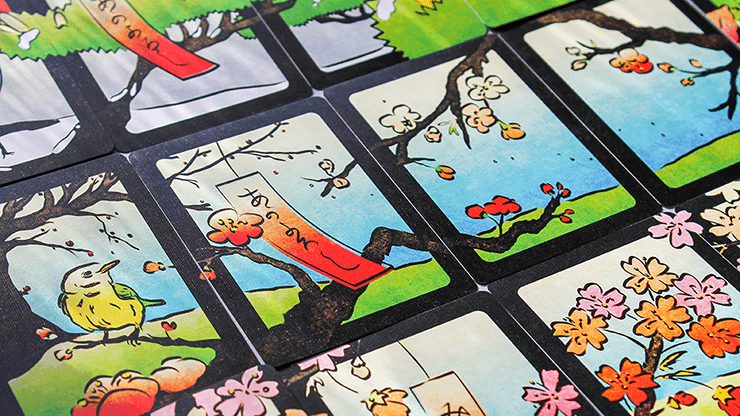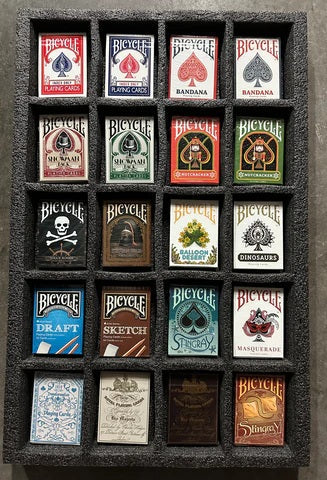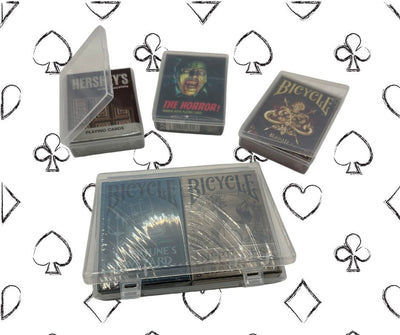The panoramic art of Hanafuda
I know very little about Japanese culture, but I can recognize something beautiful when I see it. And when I first saw the Hanafuda deck created by IndianWolf Studios, I knew at once that I was looking at something beautiful. They've produced two so far, a Hanami Fusion deck and a Sensu Fusion deck, both of which are available from PlayingCardDecks, along with a more traditional styled Hanami deck. The former are more contemporary poker style decks, while the latter is a Hanafuda deck with a more traditional look.So why did these decks capture my imagination? The first thing that caught my attention was the polyptych artwork, which means that the cards can be placed together to make a larger panoramic picture. In the case of the Hanafuda decks, each set of four cards can be placed together to form a panorama known as a tetraptych. Pictured here are the cards corresponding to the month of December (flower: Paulownia). It's brilliant and it's beautiful!
But there's more going on here with these attractive panoramic cards besides the stunning artwork. With a Hanafuda deck you are getting a game system that has its roots in Japan, and lets you play a set of unique games designed specifically for that deck. You can learn more about Hanafuda over on Wikipedia here, but let me walk you through some of the basics that you need to know. Meanwhile, here's another artwork teaser, this time showing the cards for June (flower: Peony).
Hanafuda cards & rules
Hanafuda literally means "flower cards" in Japanese. Originating in Japan, hanafuda refers to special playing cards that can also be found in Hawaii and Korea. Unlike the traditional deck that was popularized in Europe and that most of us are used to, Hanafuda cards normally have twelve suits. Each of these represents a different month of the year, such as January or February. Furthermore, each different suit/month is designated by a unique flower, and the four cards of each month can be placed together to make a panoramic image that includes that flower.Traditionally, genuine Hanafuda cards from Japan are very small thick cards, and this is thought to be closely connected with their origin. For a lengthy period between the 17th and 19th centuries, gambling and playing cards were banned in Japan, and this promoted the development of small cards that could be easily hidden, so that the gambling could continue undetected. Hanafuda cards have a long history, and do have a close association with gambling type games. But over time many different games have been invented for the Hanafuda deck.
Apparently rules for Hanafudu games can be hard to find or interpret, given the language barriers involved and the gaps between cultures and traditions. In the words of Jason Johnson from IndianWolf Studios, "The scarcity of decent rules is a major hindrance to new hanafuda players. Years ago, when we got our first hanafuda decks, we spent a lot of time gathering (& translating) rules just so we could learn to play. After that, we spent even more time trying to find other hanafuda games to play. In the end, we decided we should put our knowledge & research into a book so more people could learn to play hanafuda. For our rulebook, we did our best to preserve the games (and their variant rules), while making them more accessible to players.
That's why good folks at IndianWolf Studios have stepped up to the plate by producing a full-colour book (available as a hard copy or an eBook) in combination with the projects that produced their modern Hanafuda decks. As a big fan of card games, I was happy to get my hands on the hard copy of this book, and was very impressed. Let's be honest, 236 pages is impressive! The book contains a collection of 37 different games organized into categories, in sections for four main types of games: Capture Games, Sequence Games, Luck Games, and Fusion Solitaire Games. It also contains quick reference charts to help with scoring, and lots of game-play and scoring examples, pictures, and variants. I've browsed through some feedback on the rule book, and it's been very well received, with a large number of positive comments that confirm its usefulness and its credibility in giving reliable rule-sets for Hanafuda games.
Hanafuda games
But what kinds of games can you play with a Hanafuda deck? The 37 games included in the IndianWolf Studios rulebook arranged by four categories, based on type. Games are arranged by difficulty within each of these sections, using a handy color code (e.g. Absolute Beginner, Beginner, Intermediate, Expert). The publishers describe the categories as follows:● Capture Games are the most popular Hanafuda games. Capture games involve capturing cards from a field and creating yaku (special combinations of cards) to score points.
● Sequence Games involve playing cards from your hand in sequential order with the objective of emptying your hand.
● Luck Games are simple, fast-paced, gambling-oriented games. Many of the games in this section were traditionally played with Kabufuda decks.
● Fusion Games are a collection of Western-inspired games that we reinterpreted and designed for gameplay with a Hanafuda deck. These games provide a familiar platform for Western players to become more comfortable with the Hanafuda deck.
Some of the games in the Fusion Games category will be immediately familiar to anyone who has some experience with Western card games. Games like Pyramid, Solitaire, and Eight Off are clearly just versions of traditional solitaire games (see photo below), while games like Hana-Rumi and Hana-Gin have obvious counterparts with traditional Rummy and Gin. These are just designed to get you familiar with the Hanafuda deck.
But it's really the Hanafuda games themselves that are of special interest. The Luck Games are fast and fun games good for casual game-play in social settings, while the Sequence Games have a more serious and thoughtful feel. Games from the Capture Games category require you to capture cards from a pool and creat point-scoring combinations, with a style similar to traditional card games like Scopa and Cassino. Once you're familiar with the cards, I'd recommend trying the classic and popular Japanese two player game Koi-Koi, and eventually the more complex 2-7 player game Go-Stop, which is arguably the most popular game played with Hanafuda cards in Korea.
Koi-Koi is a traditional two player game from Japan, and is perhaps the single most common game that people use Hanafuda cards for. The aim is to form special card combinations (called "yaku") from cards in your point pile, which you capture from the table using matching cards in your hand or drawn from the supply. Once you make a "yaku", you can cash in your points, or "keep going" (in Japanese literally: koi-koi)) to try to get more point-scoring yaku. It's an enjoyable game that one person described as "a mix of Poker and Cribbage but with prettier cards!" There's considerable luck, but it's easy, fun, light, relaxing, and addictive, and you can play as long or short as you like. Here's another great description from someone who really enjoys the game, and which should whet your appetite: "It's got the fishing of Scopa, the set-collection of Mah-Jong and the delightful eccentricity of Cribbage."
Go-Stop is effectively an advanced version of Koi-Koi. While it originated in Japan, Hanafuda eventually spread from Japan to Korea, and which explains why this more complex form of the game game is so popular there, and why it is also called Korean Poker. Like Koi-Koi, this is a luck-oriented game with parallels to the `fishing' of Italian Scopa, and can be very enjoyable in the right context. This Korean social or gambling game has a good balance between luck and skill, and also works well for just two players. Rounds only take around 10 minutes, and it has just enough strategy to become fiercely addictive.
Hanami Hanafuda deck
What IndianWolf Studios has done is taken the concept of Japanese Hanafuda, but brought it to a regular deck of poker-sized cards.The Hanami Hanafuda deck is for me the most beautiful of them all. Each month features a different plant or flower, such as January (flower: Pine) and February (flower: Plum), and the artwork also captures something of the seasons. One of my favourite suits is the month of August (flower: Suzuki Grass), which has a splendid panoramic image that includes a colourful moon-filled sky as backdrop.
Koi were chosen for the card backs and Jokers, along with an extra suit, since in Asian culture they are common symbols of prosperity and longevity. Here's a look at the cards for May (flower: Iris).
Hanami Fusion deck
Besides the idea of bringing Hanafuda to standard playing cards, IndianWolf Studios has created a companion deck which blends this with the usual suits and values of Western playing cards. The traditionally styled Hanami Hanafuda deck is magnificent, and is ideal for playing Hanafuda games, but it doesn't have traditional suits. To enable cards like these to be used for standard playing card games as well, a hybrid "Fusion" deck was made. Called this Hanami Fusion deck, this combines the Hanafuda cards with the familiar indices of a regular deck.White instead of black borders were used, because this helps ensures that signs of wear from shuffling don't quickly show up. But more importantly the number and suit of standard playing cards now appears in the indices of the cards. This example shows cards for the month of September (flower: Chrysanthemum).
To retain some traditional elements as well, the elements identifying the card in a traditional Hanafuda deck (flower and month/type) are added with icons below the number and suit.
The result is a multi-purpose deck that can be used for games of both Eastern and Western origin. It's functional, while retaining the charming and vibrant panoramic artwork of the original, because the artwork still matches when you place four cards of the same value besides each other.
Sensu Fusion deck
The publishers have also made a follow-up deck with alternative artwork, which represented by their Sensu Fusion deck. This again combines the Hanafuda deck with the indices of standard playing cards, to create a deck that proves to be a meeting of East and West.Like the Hanami deck, it features floral imagery in the 12 suits of traditional Japanese hanafuda. But the artwork has a whole new direction, with inspirations including pottery glazes, woodblock prints, and hand illustrated drawings of Japanese artists. These cards are also standard poker sized, but have a more serious and earthy look, and less of a cartoon-like and playful feel.
Night Parade Fusion deck
The latest Hanami project from IndianWolf Studios is called the Night Parade Fusion deck, and is currently up for funding on Kickstarter.The artwork depicts yokai, which is a broad term in Japanese folklore that includes a whole range of supernatural beings and strange phenomena, including monsters, spirits, and more. This deck takes its name from the stories that describes all the `yokai' that enter the human world at night. Some stories describe the Night Parade as an orderly procession traveling the roads, while others characterize it as an unruly horde spreading pandemonium.
The Night Parade Fusion deck will comes with a bonus 16-page full-color booklet containing the rules for the game Orochi. This is a 2-4 player shedding/climbing game (the well-known card game President is also a climbing game), and has been designed and created especially for this deck. .
Final Thoughts
What I love first of all about the modern Hanafuda decks from IndianWolf Studios is that every card is unique, and yet each of the 13 sets of four cards can be cleverly combined to produce larger panoramic images, depicting colourful and eye-catching floral scenes. Collectors like me are a real sucker for this kind of thing, because the creative and visual beauty gives these unusual cards an instant appeal. I'm not likely to ever try to hunt down an authentic deck of Hanafuda playing cards from Japan or Korea, and the smaller and thicker cards aren't likely to interest me anyway. But publishing a colourful and artistic deck like this on poker-sized cards immediately gets my attention.But these cards are functional as well as beautiful. These playing cards draw on a rich tradition of card games in the Orient, with the obvious inspiration being the floral motifs and symbolism-rich imagery of traditional Japanese Hanafuda. And if you enjoy trying new card games as I do, then with the rulebook in hand, these delightful and unusual decks give you access to a large range of games that have a long history and are still popular in Japan and Korea today.
The small size of traditional Hanafuda cards can make them hard to shuffle and use, so that's a practical reason why it is welcome to see this style of game printed on regular sized cards for the first time. It also means that people like me, who would otherwise be entirely unfamiliar with this genre of games, now have the ideal platform and equipment to learn and explore popular games like Koi-Koi and Stop-Go.
At the same time the Fusion deck can be used for standard card games as well as for all Hanafuda games, courtesy of the familiar French suits that have been added in. Sometimes East really does meet West, and here you get the best of both worlds, so you can either play traditional cards, or one of the many games in the Hanafuda universe. Or as a collector of playing cards, you can just add this to your shelf, as an unusual and creative deck of playing cards, that both looks beautiful, and is closely connected with a rich tradition different than your own.
Where to get them? You can get the Sensu Fusion deck, Hanami Fusion deck and traditionally styled Hanami deck right here on PlayingCardDecks, while the Night Parade Fusion deck is currently up for funding on Kickstarter. The rulebook is available from the publisher IndianWolf Studios in two formats (Sensu edition or Hanami edition), with artwork corresponding to either of the first two decks.
About the writer: EndersGame is a well-known and respected reviewer of board games and playing cards. He loves card games, card magic, cardistry, and card collecting, and has reviewed several hundred boardgames and hundreds of different decks of playing cards. You can see a complete list of his game reviews here, and his playing card reviews here. He is considered an authority on playing cards and has written extensively about their design, history, and function, and has many contacts within the playing card and board game industries. You can view his previous articles about playing cards here. In his spare time he also volunteers with local youth to teach them the art of cardistry and card magic.





